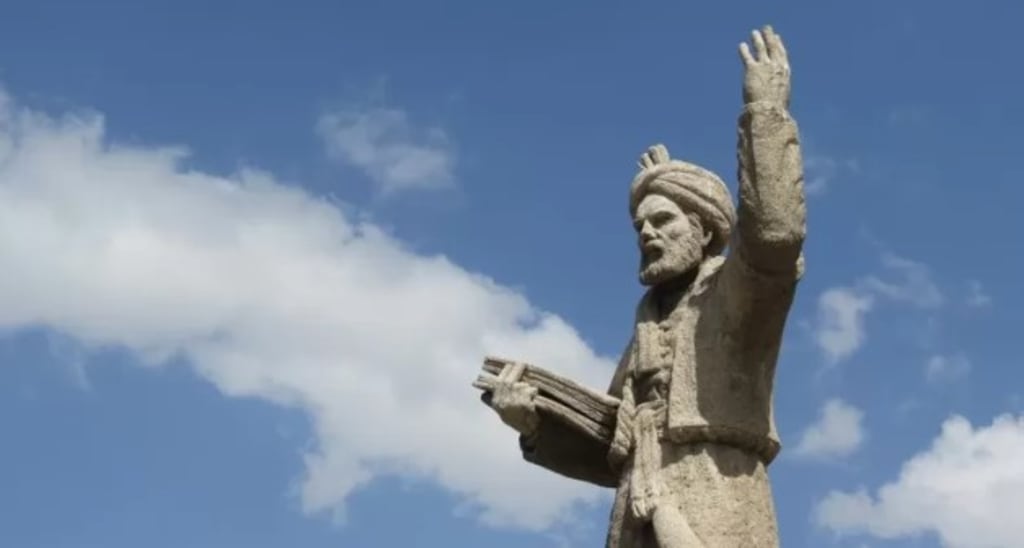Ferdowsi: The Persian poet who 'revived the Ajam' who could not win the prize from Mahmud Ghaznavi
It was a thousand years ago when Mahmud Ghaznavi invaded India successively and during his reign of about 30-31 years he invaded India some 17 times and got a large amount of booty. .

It was a thousand years ago when Mahmud Ghaznavi invaded India successively and during his reign of about 30-31 years he invaded India some 17 times and got a large amount of booty. .
It is said that he acquired a lot of treasure from the famous Somnath temple in Gujarat. Similarly, he acquired a lot of wealth even after his victory over the Raja of Mathura.
After a similar attack, on his way back to his kingdom at Ghazni, he encamped with his army near the capital of a Raja and sent a messenger to the Raja to accept his suzerainty.
The king was impatiently waiting for the answer in his tent when the messenger came, immediately Mahmud Ghaznavi said to the prime minister, "Look, what answer has he brought?" , Garz (a type of weapon), battlefield and Afrasiab will be there.
The king was very happy with this answer and asked in great emotion whose poem it was. According to Shibli Nomani, the minister said, "of the unfortunate one who ate blood and liver for 15 years and got nothing." It is regrettable to reach Ghaznain and remind him that the reward of his service should be delivered to him after reaching the throne.
The unfortunate person mentioned by the Wazir was none other than the Persian poet Ferdowsi who claimed to have revived Ajam with his work Shahnama.
His book Shahnama is an achievement of the Persian language, about which Allama Ibn Al-Athir wrote at the end of his work "Muthal al-Sayer" that "the Arabic language, despite its vastness and abundance of words, could not provide an answer to Shahnama." .'
Early life of Ferdowsi
Ferdowsi was born in the year 329 Hijri or 940 AD in a village near Tus to a landed family, but nothing can be said with certainty about this.
There is not much information about his name, however, he is mostly remembered by his surname Abu Ishaq, but the well-known Urdu critic Allama Shibli Nomani in his work on 'Firdosi' named him Hasan bin Ishaq bin. Sharaf is written. He had the surname Ferdowsi and in some places Ibn Sharaf Shah has also been used.
Shibli Nomani, the author of the Persian Cash History of Shahr al-Ajm, has mentioned an incident regarding Ferdowsi.
He has written that when Ferdowsi was born, his father had a dream that the new-born child climbed on the roof and shouted slogans and there were loud cheers from all sides. Mentioning this to Al-Din, he said that this boy will be a poet and the fame of his poetry will spread throughout the world.
Ferdowsi's life circumstances have been written frequently but there are many differences between them. Being born in a peasant or landlord family, Ferdowsi's family was prosperous and he did not worry about his livelihood, so he became interested in acquiring knowledge when he reached the age of maturity, and since there was a period of poetry and poetry at that time, he I was born with a passion for poetry, which reached perfection with time.
A claim to resurrect the universe
That time was the period of the defeat of the Iranians and the victory of the Arabs or the world of Islam. American Iranian scholar Azar Nafisi writes in the preface to the English translation of Ferdowsi's world-renowned Shah Nama that her father "always insisted that Persians (Iranians) basically had no home." was, except for his literature and that too especially for his poetry.'
He wrote that 'this country, our country, has been attacked or attacked many times, and every time the people of Persia began to lose their sense of history, culture and language, they found their poets the real defenders of their home. '
Many literary critics and historians have called the period of two hundred years after the defeat of Persia as the 'Agem Ki Khamshi Ka Period'. Anyway, Ajam means dumb and this name was given by the Arabs to the rest of the world for their eloquence, eloquence and rich Arabic language.
These situations are called by the writer Azar Nafisi trying to survive in stories. He has quoted his father's words regarding Ferdowsi, how Ferdowsi saved the identity and culture of his nation after the Arab invasion of Persia and by writing the narratives of kings, Persian mythology and history in his book Shah Nama. Redefined the identity and culture of his nation.
She writes: 'My father would point to the books and say that we have no home but them. They would repeat that this is our home, forever, yours and your brother's, and your children's and your children's children.'
Speaking to the BBC about Ferdowsi, Professor Qaiser Ahmed of Persian at Maulana Azad National Open University in Hyderabad (Deccan) said that "Firdowsi is an unparalleled master of Persian poetry and words of wisdom and one of the world's greatest storytellers." are one of
The importance of Ferdowsi is that he immortalized not only the Persian language but the entire Persian culture and history with his timeless creation. Every single word of his gives a glimpse of his sincere feelings towards the Iranian people, but he also knew the importance of his work and how important it is as a document.
Therefore, Ferdowsi himself said that he took a lot of pain and suffering in the writing of Shahnama, but as a result of 30 years of hard work, he revived Ajam in his Persian.
Professor Akhlaq Ahan at the Center for Persian and Central Asian Studies at the well-known Jawaharlal Nehru University in Delhi said that the importance and usefulness of Shahnama in literary, linguistic, historical and cultural terms is unparalleled in Persian literary history. The second cannot be a masterpiece.
His creation itself is synonymous with the height of Iran's cultural revival. Ferdowsi himself also felt this, so on its completion, he openly expressed it.
He further said that 'the rise of any language and civilization is the creation of a Hamasa or a great Masnavi and also an important means of its preservation. From this point of view, Shahnama is not only included among the great masterpieces of the world, Iliad, Odyssey, Mahabharata, Paradise Lost, etc.
The influence of the Shahnama along with the languages of the world can be found in the literary traditions of almost all the languages of India, either in the form of following it or in the form of utilizing its events and allusions. Similarly, through the Shahnama, there is also a trace of numerous mythological similarities between India and Iran.
One of the three pembers of Persian
Ferdowsi has been called the prophet of verses, while Anwari is of qasida and Saadi of ghazal. But Anwari himself says that Ferdowsi's position is not that of a teacher but of God, while his own position in front of Ferdowsi is that of a disciple and a servant.
Ferdowsi made his place in poetry until he became famous all around. Qaisar Ahmad explains that the Shahnama is not only the largest and most comprehensive collection of poems preserved from the Samanid and Ghaznavid periods, but also the most important document of the greatness of the Persian language and the clearest manifestation of the splendor of the culture. .
According to him, it is the treasure of the civilization and words of pre-Islamic or ancient Iran and the treasure of Persian literature.
But at the same time they also say that there was a tradition of Shahnama even before Ferdowsi and many people were engaged in composing Shahnama i.e. stories of kings. At the same time, Ferdowsi came to know that the well-known poet of his time, Daqqi, was also composing Shahnama and about 1000 of his poems reached him. But he was still in its early stages when he died so Ferdowsi took up the task of writing the Shahnama and started writing it on his own.
Qaisar Ahmad explains that before the arrival of Ghaznavi, this region of Iran was ruled by the Sassanid sultans and they wanted the achievements of the kings, braves and wrestlers of Iran to be recorded so that their greatness would reach the generations to come.
Since Ferdowsi himself was very fond of Iranian language, culture and history, he took this responsibility upon himself.
Later, he found out that King Mahmud, who was ruling Ghazni, was very interested in history and bravery as well as poetry and he also wanted the history of Sultans to be written. So he intended to go there, rather it is said in some places that he visited there on the invitation of Sultan Mahmud.
Journey to Ghazni
Shibli Nomani has written that on the invitation of Mahmud Ghaznavi, Ferdowsi decided to go to the throne, but even before his arrival, the courtiers started planning against him.
Badi-ud-Din Dabir, the Mir Munshi of the court, said to the court poet Al-Zarri that the king had been thinking of writing the Shahnameh for some time, but none of the poets of the court supported him, and if Ferdowsi did it, then the court The honor of all poets will be found in the dust. Entri said that the king could not be asked to return Ferdowsi, but some other arrangement should be made and to prevent him from reaching there, he sent a letter to Ferdowsi that the king no longer even thought of the Shahnama. So they should go back.'
Ferdowsi wanted to return from Herat, but then he thought that there might be some mystery, so he abandoned his intention to return. By fate, at the same time, a quarrel arose between Al-Zantri and Badiuddin, so Badiuddin sent a messenger to come to Ghazni immediately.
About the Creator
Crux News
CRUX is your daily news guide to the big events that are shaping our world. We track news, geopolitics, diplomacy and defence strategies and explain how they shape national policies. Crux makes sense of global developments, and analyses...






Comments
There are no comments for this story
Be the first to respond and start the conversation.